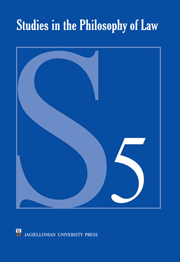Book contents
- Frontmatter
- Contents
- Preface
- I Legal Implications of Medical Advances
- II Evolutionary Approach to the Normativity of Law
- III Appendix
- 11 Some Psychological Aspects of Knowledge Management in Legal Practice
- 12 On the Meaning of the Concept of Positive Freedom and Its Role in Normative Discourse
- About the Authors
12 - On the Meaning of the Concept of Positive Freedom and Its Role in Normative Discourse
from III - Appendix
Published online by Cambridge University Press: 05 September 2014
- Frontmatter
- Contents
- Preface
- I Legal Implications of Medical Advances
- II Evolutionary Approach to the Normativity of Law
- III Appendix
- 11 Some Psychological Aspects of Knowledge Management in Legal Practice
- 12 On the Meaning of the Concept of Positive Freedom and Its Role in Normative Discourse
- About the Authors
Summary
Two concepts of freedom
The goal of this essay is to try to refute three main objections which can be raised against positive freedom. The first objection says that the concept of positive freedom is irremediably vague. The second one asserts that positive freedom is unattractive as a personal ideal. The third objection says that positive freedom is dangerous as a political ideal. Before I deal with these three objections, let me present some introductory remarks on the concept of positive freedom.
As is well known, positive freedom is one of two concepts of freedom (the other being negative freedom) analyzed by Isaiah Berlin in his famous essay Two Concepts of Liberty. The intuition that stands behind the distinction between negative and positive freedom is that we can use the term ‘freedom’ to describe two markedly different phenomena: either a situation which is external to an agent or an internal state of an agent. In the former case, by saying that an agent is free we mean that she would not encounter external (i.e. imposed by other persons) constraints if she wanted to act on various desires (those desires which she actually has and which she could have as a human being), i.e. is negatively free, whereas in the latter case by saying that an agent is free we mean that she ‘governs herself’ – is a true master of herself, i.e. is positively free.
- Type
- Chapter
- Information
- Studies in the Philosophy of LawLaw and Biology, pp. 185 - 193Publisher: Jagiellonian University PressPrint publication year: 2010



